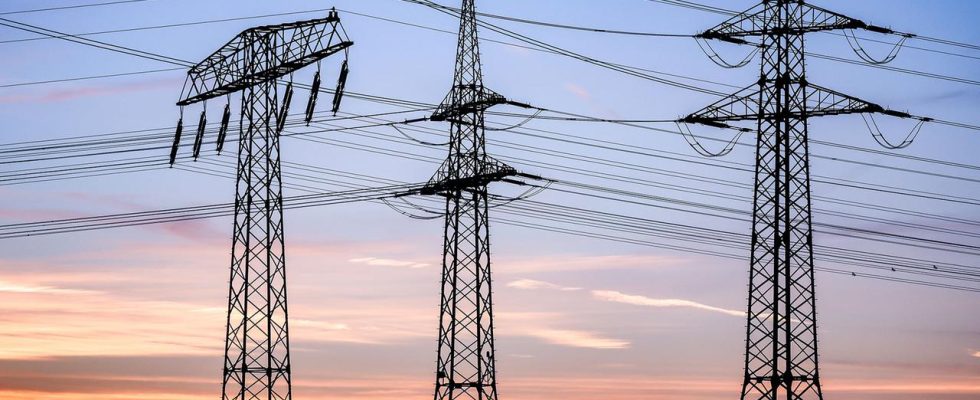A subsidized industrial electricity price is controversial – in the federal government, but also in the economy. The states, on the other hand, unanimously support the idea and are discussing it in the Federal Council today.
Sixteen to zero – the countries agree on the price of industrial electricity. Which may also have to do with the fact that the costs for such support would have to be borne solely by the federal government.
Economics Minister Robert Habeck had already presented a concept in May with a price cap of six cents per kilowatt hour of electricity for energy-intensive companies; the state would cover the rest. The Green politician wants to cover the costs – up to 30 billion euros by 2030 – from the economic stabilization fund, which is already used to pay for the energy price brakes. Which, of course, meets with bitter resistance from Christian Lindner (FDP): The finance minister considers an expansion of the intended use to be unconstitutional and also expects problems with EU state aid law.
Scholz: So far no convincing solution
The Chancellor is also skeptical. Olaf Scholz had already told entrepreneurs in August: “We cannot afford a debt-financed flash in the pan that fuels inflation again or a permanent subsidy of electricity prices with a watering can.” The SPD politician said this week in an interview with “Wirtschaftswoche” that support should be considered in individual cases to bridge the gap. But so far there is no solution that has convinced everyone. “Including me,” said Scholz literally.
Many industry representatives are currently trying to persuade people. BDI President Siegfried Russwurm pointed out at his association’s climate congress on Tuesday that it was only about a small group of affected companies: companies that, on the one hand, were particularly hard hit by the high electricity prices and, on the other hand, were in international competition.
Christian Hartel, CEO of Wacker Chemie, also emphasized at the climate congress that the support is only necessary for a few years. Electricity will be cheaper and available in larger quantities by the 2030s at the latest – “then the transformation will take place on its own,” says Hartel. To add: “Only: I would like to experience the 1930s.”
Dramatic warnings about company closures and relocations were also articulated on Wednesday at the chemistry summit in the Chancellery. According to union leader Michael Vassiliadis from IG BCE, he is picking up on corresponding signals. And North Rhine-Westphalia’s head of government Hendrik Wüst (CDU) said: “It’s five to twelve for chemistry and other energy-intensive companies.”
Economists see clear disadvantages
Despite such clear warnings, most economists are critical. This became clear, for example, during the presentation of the autumn report by the leading German economic research institutes. Subsidized electricity would be a mistake, they say. The economists also dispute a basic assumption of the proponents of an industrial electricity price: “Since electricity production in Germany is likely to remain permanently more expensive than in other countries, the necessary structural change would be halted.”
In addition, supporting the industry would have disadvantages for many others, says Professor Oliver Holtemöller from the Leibniz Institute for Economic Research in Halle (Saale): Artificial cheapening would increase the demand for energy, which in turn would increase the price for all other companies . “That’s why this is not a suitable instrument from a macroeconomic perspective,” said Holtemöller.
This is one reason why opinions differ even within the economy. The associations of medium-sized companies vehemently oppose subsidized industrial electricity prices. The Association of Family Businesses praises Chancellor Scholz for withstanding the pressure from the chemical industry and the SPD and Green parties in the Bundestag. “He deserves recognition for this,” said Marie-Christine Ostermann, the association’s president. What is more important is to expand the energy supply as quickly as possible in order to bring prices down.
Alternative 1: Reduce electricity tax
Politicians have long been thinking about alternatives or a possible combination of different measures. A general reduction in electricity taxes could help everyone, citizens and companies. But it would be even more expensive for the federal government than an industrial electricity price – so far the federal government has received around eight billion euros from it. It would also be possible for the federal government to extend the so-called peak compensation for electricity-intensive companies, which is actually supposed to expire at the end of the year.
Alternative 2: Special contracts for companies
The FDP, in turn, wants to support companies that conclude special contracts with renewable energy providers, so-called “power purchase agreements” (PPA). According to the deputy FDP parliamentary group leader Lukas Köhler, electricity from external energy parks could be treated in the same way as if solar systems or wind turbines were located directly on the respective company premises. Then almost all taxes and levies will no longer apply. “This means you can achieve internationally competitive prices and at the same time create a higher energy supply,” is Köhler’s argument.
The problem: Such additional energy parks still have to be created – even if the “Germany pace” announced by Chancellor Scholz is adhered to, this would take at least two years. But that’s not enough for Saarland Prime Minister Anke Rehlinger (SPD), who introduced the motion for a resolution on industrial electricity prices to the Federal Council: Of course, she also believes the massive expansion of renewable energies is right. But until that happens, a “bridge” in the form of a reduced industrial electricity price is necessary – “so that electricity remains affordable until then.” The economy now needs a strong signal about this. The federal states would promote this in Brussels and Berlin – “and we need a quick answer to that.”
Economics Minister Habeck is pleased about the support from the federal states. He currently sees the probability of introducing an industrial electricity price at 50 percent.

